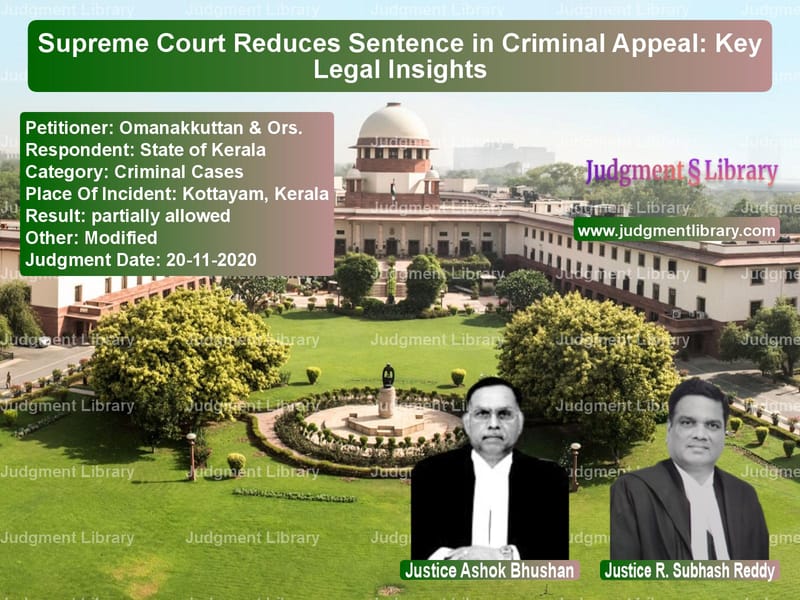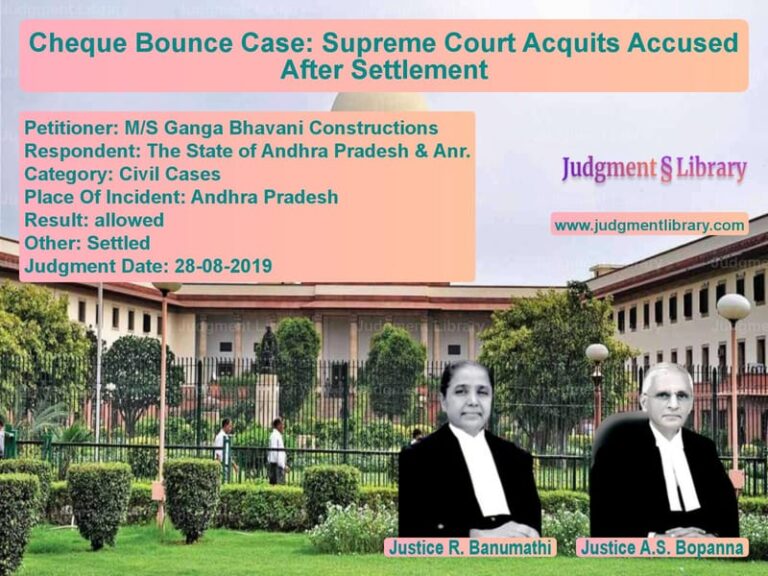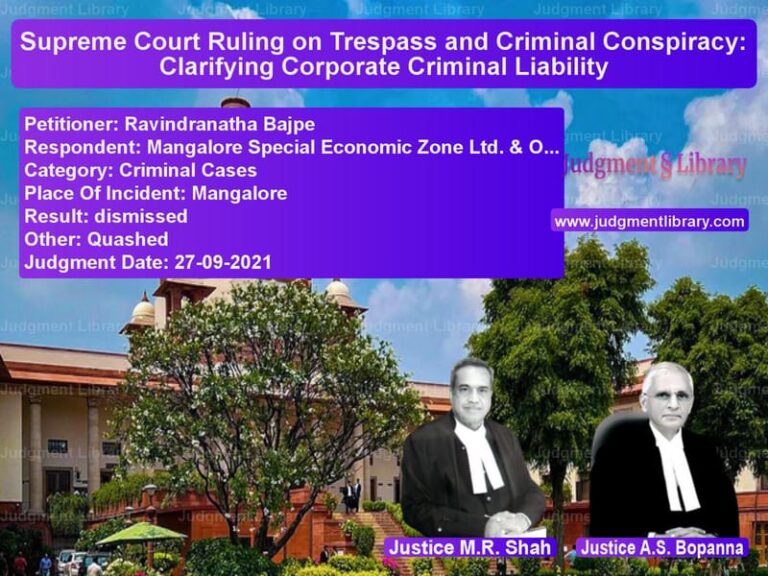Supreme Court Reduces Sentence in Criminal Appeal: Key Legal Insights
The Supreme Court of India delivered a significant judgment in the case of Omanakkuttan & Ors. v. State of Kerala, dealing with an appeal against conviction and sentencing under Sections 308, 326, and 324 read with Section 34 of the Indian Penal Code (IPC). The case revolved around an incident of physical assault resulting in grievous injuries, with the appellants challenging their conviction and sentence. The apex court, while upholding the conviction, reduced the quantum of sentence and compensation for the third appellant.
The judgment highlights the importance of proportionality in sentencing and underscores the legal principles guiding the imposition of penalties. This case provides a crucial precedent on the discretionary powers of courts in modifying sentences based on mitigating factors such as time already served and economic conditions.
Background of the Case
The case originated from an incident that occurred on January 13, 2002, where the appellants were accused of causing multiple fractures to the victim. The prosecution charged them under Sections 308, 326, and 324 read with Section 34 IPC. The trial court, upon evaluating the evidence, convicted all three accused and imposed the following sentences:
- Five years rigorous imprisonment each under Section 308 read with Section 34 IPC.
- Five years rigorous imprisonment and a fine of Rs. 5000 each under Section 326 IPC, with default leading to two years of simple imprisonment.
- No separate sentence under Section 324 IPC.
The trial court also ordered that the fine amount be paid to PW-1 as compensation.
Appeal to the High Court
The appellants challenged their conviction before the Kerala High Court, which upheld the trial court’s finding of guilt but modified the sentence as follows:
- Reduced the imprisonment term under Section 308 read with Section 34 IPC to three years and imposed a compensation of Rs. 25,000, with a default clause of two years simple imprisonment.
- Reduced the imprisonment term under Section 326 IPC to three years and imposed a compensation of Rs. 25,000, with a default clause of two years simple imprisonment.
- No separate sentence for the offense under Section 324 IPC.
Despite this modification, the appellants remained dissatisfied and filed a criminal appeal before the Supreme Court.
Petitioners’ (Appellants’) Arguments
The appellants’ counsel contended the following:
- The conviction was based on insufficient evidence, and there was a delay in apprehending the accused (10 months after the incident).
- There was no proper lighting at the place of occurrence, making identification of the accused questionable.
- Given that the incident took place in 2002 and involved a dispute among relatives, leniency should be exercised in sentencing.
- The economic condition of the appellants made it difficult for them to pay the compensation imposed by the High Court.
While maintaining that the conviction itself was flawed, the counsel primarily sought a reduction in the quantum of sentence and compensation for the third appellant.
Respondent’s (State’s) Arguments
The counsel for the State of Kerala argued that:
- The conviction was based on reliable evidence, including medical reports confirming multiple fractures.
- The injuries inflicted were serious, and the appellants deserved the punishment awarded.
- Given the gravity of the offense, no further reduction in sentence or compensation was warranted.
Supreme Court’s Observations and Judgment
1. Consideration of Sentencing Principles
The Supreme Court, while addressing the issue of sentencing, reiterated that punishment should be proportionate to the offense. It considered factors such as:
- The passage of time since the incident (over 18 years).
- The third appellant had already served more than two years of imprisonment.
- The financial hardship of the appellant in paying the compensation amount.
2. Reduction of Sentence and Compensation
The Supreme Court, while upholding the conviction, modified the sentence as follows:
- The third appellant’s sentence for offenses under Sections 308 and 326 IPC was reduced to the period already undergone.
- The compensation amount under Section 308 read with Section 34 IPC was reduced from Rs. 25,000 to Rs. 5,000.
- The compensation amount under Section 326 IPC was reduced from Rs. 25,000 to Rs. 5,000.
- The compensation was to be paid within two months, failing which necessary legal consequences would follow.
With this modification, the appeal was partly allowed.
Key Takeaways from the Judgment
1. Judicial Discretion in Sentencing
The case highlights how appellate courts exercise discretion in modifying sentences based on mitigating factors. Courts balance the need for punishment with considerations of justice, rehabilitation, and proportionality.
2. Economic Hardship as a Factor
The judgment acknowledges that economic hardship can be a relevant factor in determining compensation amounts. The court reduced the fine considering the financial status of the appellant.
3. Passage of Time as a Mitigating Factor
Given that the incident occurred in 2002, the court took into account the long duration since the offense and the time already served by the accused in custody.
4. Importance of Fair Compensation
While reducing the compensation amount, the Supreme Court still ensured that some amount was paid to the victim, reinforcing the principle that victims must be compensated for injuries suffered.
Conclusion
The Supreme Court’s ruling in Omanakkuttan & Ors. v. State of Kerala serves as an important precedent for determining appropriate sentencing in cases involving bodily harm. The judgment reiterates the principle that justice must be served while also considering humanitarian aspects such as financial hardship and the passage of time.
This case underscores the need for balanced sentencing and affirms the role of higher courts in ensuring fairness in the justice system. The decision reflects a nuanced approach to criminal sentencing, ensuring that punishment is neither excessive nor inadequate but proportionate to the crime committed.
Petitioner Name: Omanakkuttan & Ors..Respondent Name: State of Kerala.Judgment By: Justice Ashok Bhushan, Justice R. Subhash Reddy.Place Of Incident: Kottayam, Kerala.Judgment Date: 20-11-2020.
Don’t miss out on the full details! Download the complete judgment in PDF format below and gain valuable insights instantly!
Download Judgment: Omanakkuttan & Ors. vs State of Kerala Supreme Court of India Judgment Dated 20-11-2020.pdf
Direct Downlaod Judgment: Direct downlaod this Judgment
See all petitions in Attempt to Murder Cases
See all petitions in Fraud and Forgery
See all petitions in Bail and Anticipatory Bail
See all petitions in Judgment by Ashok Bhushan
See all petitions in Judgment by R. Subhash Reddy
See all petitions in partially allowed
See all petitions in Modified
See all petitions in supreme court of India judgments November 2020
See all petitions in 2020 judgments
See all posts in Criminal Cases Category
See all allowed petitions in Criminal Cases Category
See all Dismissed petitions in Criminal Cases Category
See all partially allowed petitions in Criminal Cases Category







